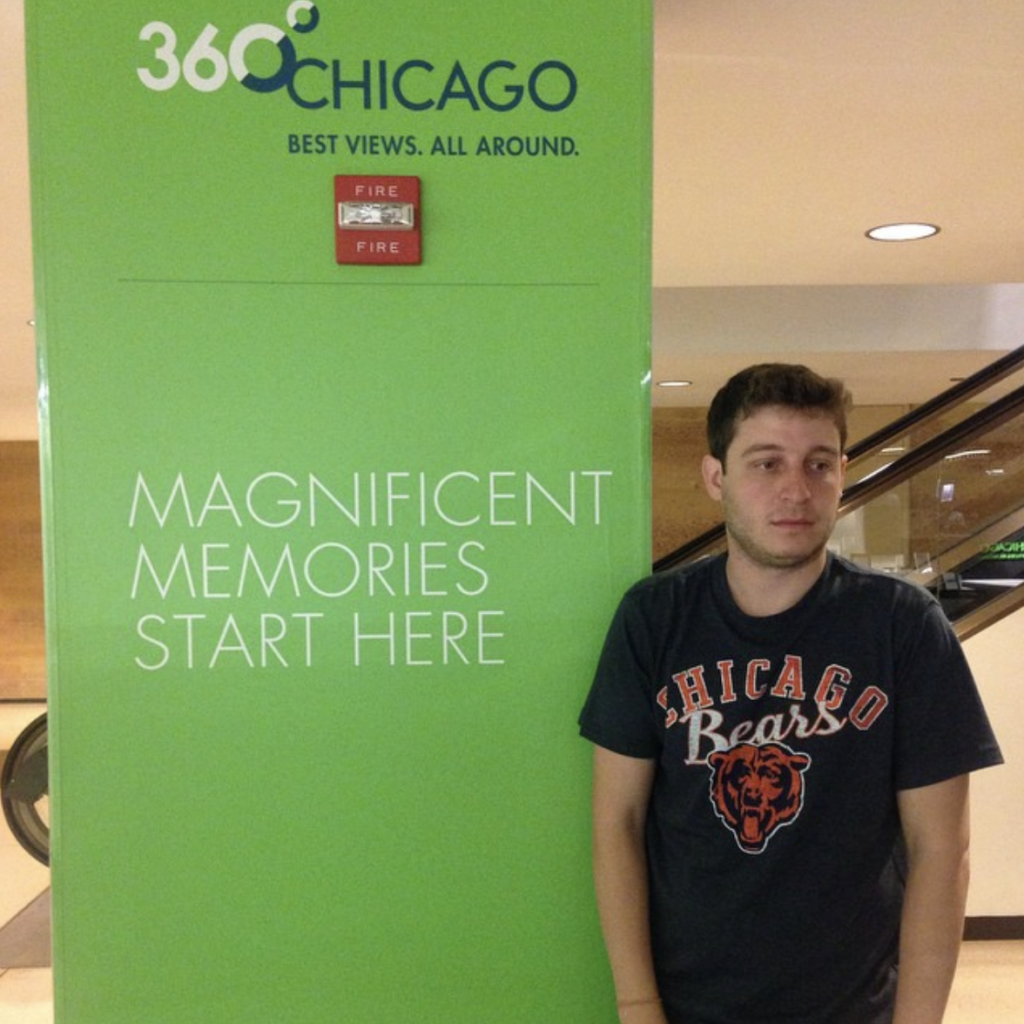Genre: Comedy (potentially Romantic Comedy)
Premise: Based on a story that went viral on Instagram, a man shows up in Chicago for a bachelor party only to find out that the rest of the party is stuck in another state. But he decides to do the bachelor activities anyways!
About: This script finished with 8 votes on last year’s Black List. I can’t find anything on the screenwriter so I’m assuming she’s new to the game.
Writer: Madeleine Paul
Details: 110 pages

Chicago Chicago!
I like this premise. Not just because it takes place in my home town. But it’s a fun spin on a common trope – the bachelor party comedy. The key to this specific concept working is the irony. Bachelor parties are PARTIES. They’re supposed to include a GROUP of people. So the second you say there’s only one person in the party, you’ve got a concept.
However, this idea is not without concerns.
Just to be clear, every script you write will have concerns. It’s how you address those concerns that will result in your script being a winner or a loser.
The big concern here with Chicago For One is – there’s no one to bounce off of. That’s where the large majority of the comedy in these bachelor party scripts comes from. The Hangover and Bridesmaids are at their funniest when the group is sparring with each other. What happens when you don’t have that? We shall see!
Cam is a 28 year old dude who works too hard. He’s also in one of those relationships where his better half doesn’t like him that much. Even worse, he doesn’t realize it.
In the meantime, workaholic Cam has to reject his best friend, Brad, who’s getting married soon and is having a bachelor party in Chicago. Brad is desperate for Cam to come but Cam keeps saying no because of work. That is until his girlfriend dumps him. Screw it, Cam says, and finally agrees to come to the bachelor party.
In one of the most logistically complicated setups I’ve ever come across, Brad, the groom, is here with Cam in New York, but for some reason he’s set the bachelor party in Chicago. So Cam flies to Chicago to go to the bachelor party but everyone else in the party, including Brad, who are still in New York, get stuck there because of weather.
Cam doesn’t know this yet and heads to the first stop on the bachelor party tour, a boat tour of the city. But that’s when he finds out that this night is going to be him and him only. The tour boat lady, Kelly, gives him this brilliant idea to go to all the bachelor events anyway and document it on Instagram. She even takes the first picture of him by himself and posts it.
Cam starts posting pictures of himself everywhere (the bean, the zoo, the aquarium, the Bears game) purposefully looking sad. Along the way, his pictures start going viral and he gets recognized. Surprinslgy, most people are supportive, rooting him on and encouraging him to say in Chicago for the full weekend. Cam reunites with Kelly, realizes there’s a spark there, and is starting to think this lonely bachelor party may be the best thing that ever happened to him. That is until his ex shows up, wanting to give their relationship another shot.

The good news is, I can see this being a movie. Not a huge movie. But a movie nonetheless. It’s got that marketing angle to it that does a lot of the work for you.
But the script needs a lot of work.
First, it violates one of the most important rules of screenwriting, which is to start the story as late as possible. “Chicago For One” spends the first ten pages painstakingly winding its way through a work plot that has nothing to do with the story.
This story needed Cam to get dumped so he could get to Chicago for the bachelor party ASAP and start the fun. Spending all this time inside a boring work subplot destroyed the beginning of the script.
I think sometimes we say to ourselves, “Well, we can’t just jump straight to the craziness.” You can’t have Alan, Stu, and Phil wake up from their crazy Vegas night on page 3. You need to use the first act to set them and the situation up first. But what if there isn’t much to set up? Do you set up anyway?
We could’ve easily had Cam dumped and set up that the rest of the bachelor party didn’t make it to Chicago by page 5. Probably even sooner. So if you’re not going to move things along, you gotta give us some story reasons why. And this script didn’t have that.
Also, work subplots are interesting because, on the one hand, you want to create context for your protagonist. You want to see that he has a real life so he feels real. However, it’s a case by case basis for whether to explore their work. In some movies it matters. In other movies it doesn’t.
For example, we don’t go into any relevant work subplots in The Hangover. So there was no need to get into minute detail about what they did and what the stakes were for them getting a promotion at work or what have you. However, in a movie like Pretty Woman where the whole point of the movie is that our main character needs a companion for the week while he puts a business deal together – that’s when you need to know something about the hero’s work.
You didn’t need to know anything about Cam’s work here. It’s not relevant to the story. And if you’re ever unsure about whether to include work stuff or not, put yourself in the mind of the audience. They’ve come here to see what kind of movie? In this case, a guy doing a bachelor party by himself. That’s not a concept that people want work life details on. They just want to see the fun stuff.
So why did it make the Black List, Carson?
These days, figuring out why something made the Black List is a lot like in the old days, trying to figure out why something sold. There’s always some behind-the-scenes details we’re not privy to. I remember when that totally bonkers script about the world blowing up that felt like it was written by a 3rd grader sold and everyone was wondering, HOW DID THAT SELL!? And it turned out to be Channing Tatum’s best friend and he made the studio buy the script before agreeing to star in another one of their movies.
I don’t think that’s the case here. It probably has something to do with the viral story being known and the script going out wide with a little buzz behind it because of that and the concept was memorable enough to get some votes. It’s a reminder that concept is king. It can make up for a lot of weaknesses.
So is there anything good here?
There were a few funny moments. Like when people recognized him. “Wait, wait, wait. You’re that guy. That… sad guy. Lonely guy.” Lol
And once it gets to him actually going out and doing things, it gets better. Because that’s what we came for.
And I liked the spirit of the story. It’s one of those feel-good movies, which is nice to see in a sea of scripts about sexism and racism and anger and super serious intense unhappiness. Chicago For One does a nice job reminding you that most people are good. That when someone’s having a bad day, people want to help, want to offer you an olive branch. That’s when Chicago For One was at its best.
I just don’t think the writer was ready to give this story the execution it required to deliver that feeling all the way through. There’s a lot of technical stuff that they need to improve on to make the story read seamlessly. With some guidance and a handful of rewrites, it could be a fun movie.
[ ] What the hell did I just read?
[x] wasn’t for me
[ ] worth the read
[ ] impressive
[ ] genius
What I learned: I’m going to say this as clearly as possible. You will never, in your life as a screenwriter, write something that you know is filler and get away with it. The reader will ALWAYS KNOW it’s filler. You can’t fool them. If there’s one thing readers and audiences are experts at, it’s recognizing when the script or movie is spinning its tires. There was so much in this first act that was unnecessary. It read like filler and forced the script into a difficult situation whereby it needed to save itself by the second act. Never write filler just to meet page markers. If you can get to the meat of the story before the end of the first act, on page 25, then get there. We don’t need to sit around for 15 extra pages just so you can meet some screenplay book’s requirement of when the first act is supposed to start.
What I learned 2: I do think these viral stories are good opportunities for savvy screenwriters to seek out. Zola was another recent one. Stuff that has gone viral is one more bullet in your marketing chamber for when you’re pitching something. It gives your script automatic cache, which results in interest from people around town. And, as we can see, the more places a script gets sent, the more people read it, which means the more people who can potentially vote it onto the Black List.

